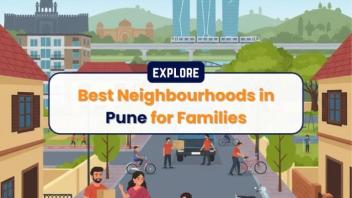Top Tempo/Truck Rental Options in Surat
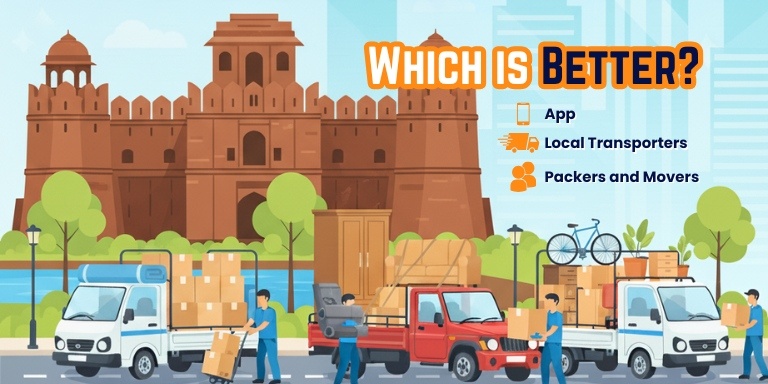
Complete, Surat-focused guidance to choose the right tempo/truck, navigate flyover restrictions, estimate costs, and handle compliance for smooth moves in Gujarat's Diamond City.
Surat Tempo/Truck Rental: Quick Summary
Surat has three practical ways to rent a goods vehicle: app-based on-demand trucks, local transporters with industrial expertise, and movers who supply truck-plus-labour. However, heavy vehicle restrictions on 7 major flyovers plus ongoing metro construction significantly impact route planning in Gujarat's Diamond City.
- App trucks: transparent pricing starting ₹280-320; best for Adajan, Vesu residential moves with real-time tracking.
- Local transporters: strong industrial network; excellent GIDC area knowledge and textile district expertise.
- Movers' trucks with labour: comprehensive solutions for diamond bourse relocations and high-value textile goods.
Who this guide is for and how to use it
- Moving within Vesu, Adajan, Piplod, or textile market areas? Use our area-specific access patterns and vehicle recommendations.
- Confused about flyover restrictions or Gujarat's e-way bill requirements? Check our updated compliance section.
- Deciding between truck-only vs full-service movers? See cost crossover examples and decision framework.
Main Options to Rent a Truck in Surat
Surat's industrial city status provides robust commercial transport infrastructure with competitive rates for both business and household moves. Choose based on move complexity, cargo type, and route restrictions.
App-based on-demand trucks
Porter leads with ₹280-320 Tata Ace bookings (1km + 70-90 mins included), while TruckGuru offers comprehensive vehicle options with insurance coverage. Great for Vesu, Adajan planned areas with real-time tracking.
- Best for: transparent pricing, verified drivers, digital payment options, same-day bookings.
- Pros: GPS tracking, standardized rates, customer support, damage claim processes, metro zone navigation assistance.
- Cons: 20-30% premium over local providers, limited negotiation, surge pricing during Diwali textile season.
Leading platforms include Porter, TruckGuru, BookMyTempo, and Blowhorn for price comparison across providers.
Local transporters/industrial operators
GIDC Pandesara and textile district operators offer industrial expertise with strong relationships across manufacturing zones. Traditional providers know every flyover restriction and alternative route.
- Best for: industrial area moves, textile goods handling, bulk cargo, flexible scheduling.
- Pros: negotiable rates, flyover restriction workarounds, textile district access, commercial cargo expertise.
- Cons: coordination effort required, variable documentation, limited digital tracking capabilities.
Contact GIDC area transporters for industrial moves or Ring Road operators for textile market relocations with local route knowledge.
Packers & movers with trucks only (driver + labour)
Established operators like Agarwal Packers and VRL Packers provide complete solutions combining vehicle rental, professional packing, and trained labor for complex household and commercial moves.
- Best for: complete relocations, high-value diamond/textile goods, appliance handling, multi-story buildings.
- Pros: professional equipment, comprehensive insurance, single invoice, damage claim support, monsoon protection.
- Cons: higher upfront costs, less flexibility for simple truck rentals, advance booking required during peak seasons.
Ideal when labor costs for truck-only approach 70-80% of full-service quotes or for diamond bourse relocations requiring security protocols.
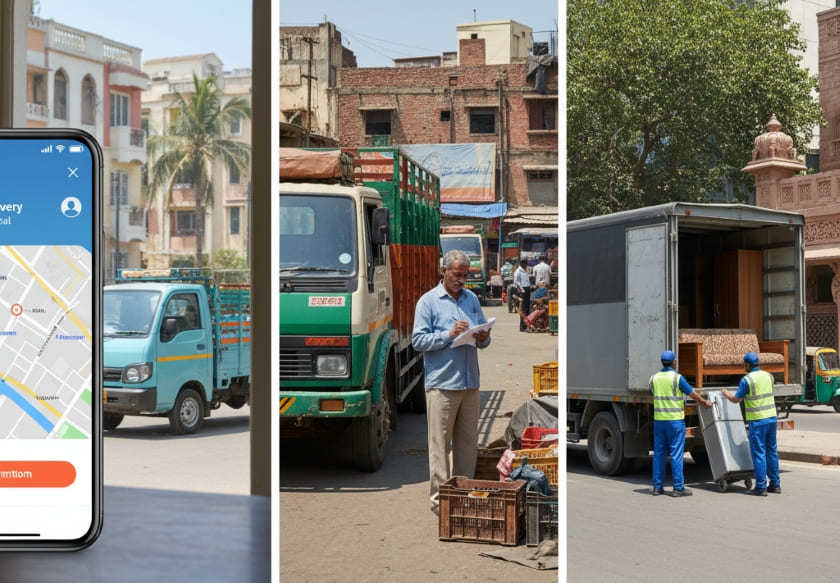
| Option | Best for | Pros | Cons |
|---|---|---|---|
| App-based trucks | Residential areas, digital convenience | Tracking, verified drivers, metro zone help | Price premiums, Diwali surge pricing |
| Local transporters | Industrial moves, textile goods | GIDC expertise, flyover workarounds | Coordination effort, variable tracking |
| Movers' trucks + labour | Diamond bourse, complete relocations | Professional service, monsoon protection | Higher costs, less flexibility |
Pick the Right Vehicle Size for Your Move
Vehicle selection depends on flyover height/weight restrictions and metro construction zones. Match your load to vehicle capacity while considering textile district narrow lanes and GIDC industrial park access requirements.
Small loads (Tata Ace/Mini trucks) — 750-900kg capacity
Essential for textile market narrow lanes (Sahara Darwaja, Ring Road) and residential basement restrictions. Tata Ace with 7.2ft × 4.9ft cargo box fits 1RK moves, small office shifts, or local textile consignments with CNG options available.
- Choose for: textile district, residential basements, narrow gated communities, quick local moves under 15km.
- Typical fit: 6-12 boxes, single bed, study table, chairs, small appliances, textile bales (limited quantity).
- Access advantage: Can navigate all flyovers and metro construction zones without restrictions.
Medium loads (8-10 ft trucks) — 1,100-2,250kg capacity
Optimal for Vesu, Adajan planned areas with wide roads and GIDC industrial parks. Tata 407 variants handle furniture-heavy 1BHKs or compact 2BHKs but require flyover restriction planning.
- Choose for: planned localities, GIDC areas, multiple furniture pieces, longer distance moves within city.
- Typical fit: Sofa set, dining table, 2 beds, wardrobe, appliances, 15-25 boxes, commercial equipment.
- Route critical: Must avoid 7 flyover bridges; add 15-30 minutes for alternative routes.
Large loads (14-17 ft trucks) — 2,500kg+ capacity
Suitable for complete office relocations and bulk textile/diamond shipments but face severe flyover restrictions. Best for GIDC-to-GIDC industrial moves with ground-level access.
- Choose for: industrial areas, complete office moves, bulk cargo with loading dock access.
- Restrictions: Banned on 7 major flyovers, limited residential access, metro zone delays possible.
- Alternative: Two medium vehicle trips often more practical than single large vehicle with route constraints.
Vehicle-size to apartment-size quick chart for Surat
| Apartment/Load profile | Recommended vehicle | Typical fit (illustrative) | Access notes |
|---|---|---|---|
| 1RK / studio / student room | Tata Ace (750kg) | 6-10 boxes, bed, study table, chair, bike | Perfect for textile district, all areas accessible |
| Light 1BHK | Tata Ace or Mini truck | Bed + sofa + 10-15 boxes + small appliances | Elevator booking essential, no flyover issues |
| Furniture-heavy 1BHK | 8 ft mini truck | Sofa set, bed, wardrobe, dining-4, 15-20 boxes | Vesu/Adajan only, flyover route planning required |
| Standard 2BHK | 10 ft truck or 2x Tata Ace | 2 beds, wardrobes, fridge, WM, 20-30 boxes | Building permission critical, avoid flyover routes |
| Large 2BHK+ / office | Multiple medium trips | Complete household or office equipment | Avoid large vehicles on flyovers, use staged approach |
| GIDC industrial move | 14-17 ft truck | Commercial equipment, textile bales, machinery | Direct GIDC routes available, ground-level preferred |
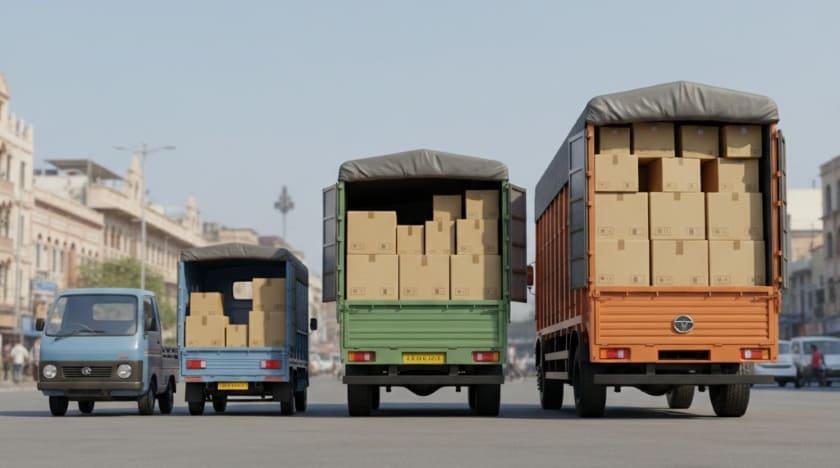
How Truck Rental Pricing Works in Surat
Surat benefits from strong industrial infrastructure with competitive pricing for both commercial and household moves. Expect base fares from ₹280-320 for Tata Ace, plus distance/time charges, labor, and GST. Factor in flyover detour costs for accurate estimates.
Cost formula: base fare + per‑km or hourly + waiting + labour + toll/parking + GST
Understanding each component helps negotiate better deals and avoid surprise charges. Surat's industrial network provides competitive rates with room for B2B volume discounts.
| Fee component | Typical range | How it's applied | Surat-specific notes |
|---|---|---|---|
| Base fare | ₹280-350 (Tata Ace) ₹550-850 (8ft truck) |
Fixed minimum including 1km + 70-90 mins | Porter standardized, locals negotiable for GIDC |
| Per‑km charges | ₹32-55 (mini) ₹65-110 (medium) |
Beyond included distance | Flyover detour adds 3-5km extra distance |
| Waiting/loading time | ₹60-180 per 30-min block | After free minutes exhausted | Metro zone delays common, negotiate buffer time |
| Labour charges | ₹450-900 per person ₹600-2,500 per trip |
Loading, unloading, stair carry | GST 28% on loading services (HSN 8428) |
| Toll & parking | ₹80-250 (city) ₹1,500-4,000 (interstate) |
Actuals with receipt verification | Flyover alternatives may reduce toll costs |
| Flyover detour charge | ₹100-300 per trip | Time and distance for alternative routes | Specific to Surat's 7 bridge restrictions |
| GST | 5-12% (vehicle) 18% (transport) 28% (loading) |
Based on service category | Request tax invoice for business reimbursements |
When per‑km vs hourly makes sense in Surat context
- Per‑km preferred: Vesu to Adajan (long distance, clear roads), GIDC area moves (direct routes available).
- Hourly preferred: Textile district moves (short distance, complex loading), multi-floor buildings without lifts.
- Metro factor: Central Warehouse to Kapodra routes better on hourly due to construction delays through 2025.
- Flyover impact: Routes requiring 7-bridge avoidance often more economical on hourly basis.
Hidden charges specific to Surat operations
- Monsoon premium: 15-25% extra June-September for waterproofing and delay coverage.
- Diwali textile season: 40-60% surge pricing with 10-14 days advance booking required.
- Metro zone delays: ₹150-400 time charges for construction-affected routes.
- Diamond bourse security: ₹300-600 for Katargam/Varachha diamond district access coordination.
- GIDC industrial timing: Early morning (6-9 AM) slots may carry ₹200-400 premium during peak factory operations.
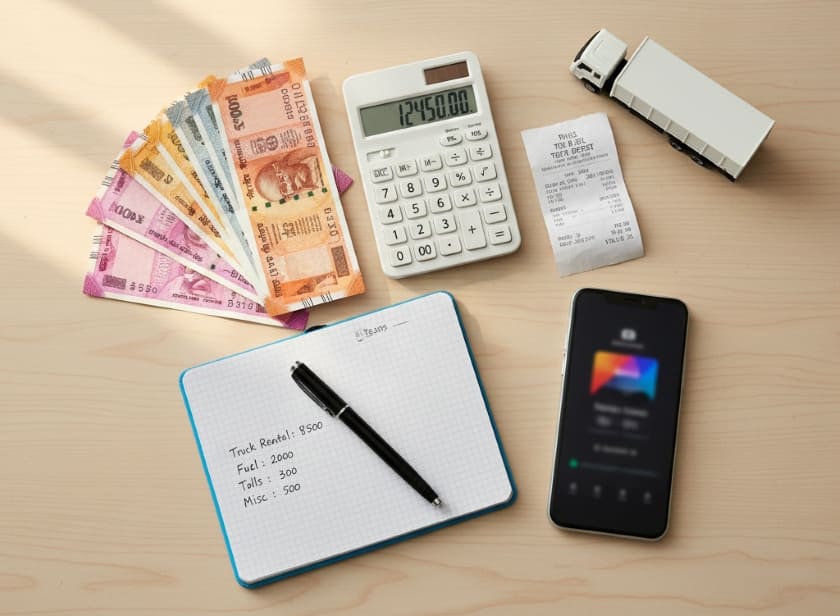
Compliance & Access Checklist (Surat/Gujarat)
Critical update: Gujarat maintains ₹50,000 e-way bill threshold for intrastate movements. Heavy vehicles face restrictions on 7 major flyover bridges, and metro construction affects multiple routes through December 2025. Plan accordingly for legal operations.
Flyover restrictions and route planning
- Banned flyovers for heavy vehicles (2.5T+): Sardar Bridge, Magdalla Bridge, Athwa Gate, Kamrej Road flyover, and 3 additional major overpasses.
- Light goods vehicles: No flyover restrictions; can use all routes including metro construction zones.
- Alternative routes: Ground-level roads add 15-30 minutes but necessary for medium/heavy vehicles.
- Metro construction zones: Central Warehouse, Labheshwar Choki, Kapodra routes face periodic closures through December 2025.
E‑way bill requirements for Gujarat (updated threshold)
- Current threshold: ₹50,000 for both intrastate and interstate movements in Gujarat.
- 19 specific goods: Gujarat requires e-way bills regardless of value for items including jewellery, tobacco, timber, and specific industrial materials.
- Household exemption: Personal effects typically exempt, but confirm with transporter for diamond/textile goods or business-related moves.
- Validity: 1 day per 200km distance. Generate through official GST e-way bill system with proper documentation.
Vehicle permits and Gujarat transport compliance
- Commercial goods vehicles over 3,000kg require permits through Gujarat RTO via VAHAN portal.
- Required documents: Registration Certificate, comprehensive insurance, tax token, PUC certificate, Certificate of Fitness, valid driver's license.
- Verify transporter's compliance with Gujarat Transport Department regulations.
Building access and society permissions in Surat
- High-rise protocols: Vesu and Adajan towers require 2.2m height for basement access, 3.5-tonne weight limits standard.
- Time windows: Most societies allow 9 AM-6 PM for goods vehicles, requiring 24-48 hours advance booking.
- Documentation: Photo ID verification, vehicle registration, resident authorization, damage indemnity for premium properties.
- Elevator booking: Service elevator reservations mandatory for 10+ floor buildings in Vesu, Piplod, Adajan complexes.
- Diamond bourse security: Katargam and Varachha diamond districts require additional security clearances and verified transporter credentials.
Surat-specific compliance resources
- Traffic restrictions — Surat Municipal Corporation updates
- Vehicle permits — Gujarat Transport Department
- E-way bill portal — GST E-Way Bill System
Step-by-Step: Booking and Move‑Day Workflow for Surat
Pre‑booking preparation (48-72 hours before)
- Platform selection: Download Porter, TruckGuru, or BookMyTempo apps. Register with contact details, identity verification, and payment methods.
- Vehicle assessment: Take room photos, create inventory lists, measure large items for elevator and flyover height compatibility.
- Route planning: Check flyover restrictions for medium/heavy vehicles, identify metro construction zones, plan alternative ground routes.
- Access coordination: Contact building management for elevator slots, verify basement height clearance, confirm RWA entry policies.
- Weather monitoring: Check monsoon forecasts June-September, arrange waterproof covers for textile/electronics protection.
Booking execution and confirmation
- Multiple quotes: Get 3-4 estimates from apps, GIDC area transporters, and movers for price comparison.
- Documentation: Confirm e-way bill requirements (₹50K+ threshold or 19 specific goods), insurance coverage, GST invoice needs.
- Labor coordination: Book appropriate number of helpers, specify stair carry needs, confirm packing material requirements.
- Flyover route agreement: Confirm alternative route understanding with driver, negotiate detour charges upfront.
- Payment terms: Negotiate advance payment discounts, clarify toll/parking/detour payment responsibility.
Move‑day execution with Surat specifics
- Metro zone navigation: Allow 20-30 minute buffer for construction delays on Central Warehouse to Kapodra routes.
- Driver coordination: Share precise location with building entry instructions, elevator booking confirmations, flyover restriction reminders.
- Monsoon protection: Verify waterproof covering installation, inspect sealing quality before loading valuable items.
- Diamond/textile handling: For high-value goods, supervise loading personally and maintain photographic documentation.
- Documentation collection: Secure proof of delivery, toll receipts, parking slips, final GST invoice with digital backups.
When to Hire Packers & Movers Instead
Cost crossover analysis for Surat market
- Truck-only becomes expensive when: Labor costs exceed ₹3,500-5,000 for multiple helpers, textile goods handling, or extended loading hours.
- Movers become cost-effective when: Complete 2BHK+ moves with diamond/textile valuables, appliance handling, and monsoon protection needs.
- Break-even point: Usually around ₹10,000-15,000 total move cost depending on complexity, flyover detours, and building access.
Surat-specific indicators for full-service movers
- Flyover route complexity: Multiple alternative routes required due to 7-bridge restrictions on medium/heavy vehicles.
- Area access challenges: Textile district narrow lanes, diamond bourse security protocols, GIDC industrial timing coordination.
- High-value items: Diamond goods, textile inventory, electronics requiring specialized packing and comprehensive insurance coverage.
- Monsoon protection: June-September moves requiring extensive waterproofing and weather-delay contingencies.
- Metro construction delays: Routes through Central Warehouse, Labheshwar, Kapodra zones need buffer time management.
Established Surat movers: compare mover charges and find local packers for comprehensive service quotes.
Decision framework: truck-only vs full-service movers
- Choose truck-only when: Simple local moves under 12km, minimal fragile items, available personal labor, flexible timing, no flyover issues.
- Choose movers when: Cross-city relocations, diamond/textile valuables, monsoon season moves, complex flyover routing, diamond bourse security needs.
- Hybrid approach: Use truck-only for bulk furniture, professional movers for electronics and high-value textiles during restricted routes.
Top Tips to Save Money and Time in Surat
Leverage Surat's industrial infrastructure advantages
- Strong transporter network: Negotiate B2B rates for industrial moves; GIDC area operators offer volume discounts.
- Return load opportunities: Outbound textile shipments to metro cities often have better availability and pricing.
- Multiple provider competition: Get quotes from apps, GIDC transporters, and textile district operators for best pricing.
Route optimization for flyover restrictions
- Light vehicle advantage: Tata Ace can use all flyovers saving 15-30 minutes versus heavy vehicles on ground routes.
- Early morning slots: 6-9 AM offers less traffic and clearer alternative routes for restricted vehicles.
- Weekend planning: Saturday-Sunday provides lighter traffic for ground-level detours around 7 banned flyovers.
- Metro zone avoidance: Until December 2025, route around Central Warehouse-Kapodra corridor when possible.
Seasonal timing strategies
- Monsoon avoidance: October-May provides better weather, lower rates, and no waterproofing premiums.
- Pre-Diwali booking: Reserve 10-14 days ahead during textile season (September-October) to avoid 40-60% surge pricing.
- Post-festival advantage: November offers excellent availability as textile shipments wind down.
- Wedding season planning: December-February sees residential move competition; book 5-7 days ahead.
Area and building-specific strategies
- Vesu/Adajan efficiency: Wide roads and planned infrastructure support larger vehicles with proper flyover routing.
- Textile district coordination: Morning hours (7-10 AM) provide better access before commercial activity peaks.
- GIDC optimization: Coordinate with factory timing to avoid peak 9-11 AM and 5-7 PM traffic.
- Diamond bourse protocol: Pre-arrange security clearances 48-72 hours ahead for Katargam/Varachha areas.
Cost reduction tactics specific to Surat market
- Bundle negotiations: Combine vehicle + labor quotes for 20-30% savings over separate bookings with industrial operators.
- Monsoon preparation: Own waterproof covers save ₹200-400 premium charges during rainy season.
- Flyover route planning: Accept ground-level routes to negotiate 10-15% discount on per-km charges.
- Payment timing: Advance payment often secures additional 8-12% discounts with established GIDC providers.
- Multi-trip bundling: For staged moves, book complete package for 15-25% better rates than individual trips.
FAQs (Updated for Surat 2025)
Which flyovers are restricted for my truck size in Surat?
Heavy vehicles (2.5T+ capacity) cannot use 7 major flyovers including Sardar Bridge, Magdalla Bridge, Athwa Gate, and Kamrej Road flyover. Light goods vehicles (Tata Ace) face no restrictions. Medium trucks should confirm specific bridge load limits with transporters.
How does metro construction affect my moving route?
Central Warehouse, Labheshwar Choki, and Kapodra routes experience periodic lane closures through December 2025. Add 20-30 minute buffer time and check Surat Metro updates 24 hours before your move for current restrictions.
What's the e-way bill requirement for household goods in Gujarat?
Personal household effects are typically exempt from the ₹50,000 threshold. However, Gujarat requires e-way bills for 19 specific goods regardless of value, including certain textiles and valuables. Confirm with your transporter based on your specific items.
Which vehicle works best for textile district moves?
Tata Ace (750kg capacity) only for Sahara Darwaja and Ring Road textile areas due to narrow lanes and congestion. Schedule early morning (7-9 AM) for best access before commercial activity peaks. Larger vehicles cannot navigate these zones safely.
Do I need special clearance for diamond bourse relocations?
Yes. Katargam and Varachha diamond district moves require verified transporter credentials, advance security notifications (48-72 hours), and proper insurance documentation. Use established movers familiar with diamond bourse protocols for high-value goods.
How much extra does monsoon season moving cost?
Expect 15-25% premium June-September for waterproofing materials, weather-delay coverage, and extended loading protection. Book covered vehicles or arrange your own protective materials to reduce surcharges. October-May offers standard rates without weather premiums.
Are truck rentals cheaper in Surat compared to other Gujarat cities?
Surat offers competitive industrial rates similar to Ahmedabad, approximately 10-15% higher than Vadodara but with better vehicle availability. Strong transporter network provides negotiation opportunities especially for GIDC and commercial moves.
How early should I book during Diwali textile season?
Minimum 10-14 days advance booking required during September-October textile rush when vehicle availability drops significantly and rates increase 40-60%. Alternative timing in November provides excellent availability as commercial shipments decrease.
Can I save money by accepting flyover detours?
Yes. Accepting ground-level alternative routes (adding 15-30 minutes) often negotiates 10-15% discount on per-km charges. Discuss route flexibility during booking to secure better rates while avoiding the 7 restricted flyovers.
Final Checklist & Next Steps for Surat Moves
Pre-move checklist (48-72 hours before)
- Vehicle booking: Compare app platforms, GIDC transporters, and movers; select based on budget and cargo type.
- Route compliance: Verify flyover restrictions for your vehicle size, identify metro construction zones, plan alternative ground routes.
- Documentation: Check e-way bill requirements (₹50K+ or 19 specific goods), confirm insurance coverage, arrange GST invoices.
- Building coordination: Secure RWA permissions, book service elevator slots, verify access routes and basement clearances.
- Weather preparation: Monitor monsoon forecasts June-September, arrange waterproof covers, plan covered loading areas.
- Diamond/textile protocol: For high-value goods, arrange security clearances, verify transporter credentials, confirm insurance limits.
Move-day execution checklist
- Route coordination: Brief driver on flyover restrictions, share alternative route maps, confirm metro zone awareness.
- Access management: Share building entry instructions, coordinate elevator access, ensure clear pathways and parking.
- Item protection: Label fragile items clearly, supervise textile/diamond goods loading, photograph valuable items.
- Weather monitoring: Verify waterproof covering installation, inspect sealing quality before departure.
- Documentation collection: Secure POD, toll receipts, parking slips, final invoice with digital backups.
- Payment settlement: Verify all charges against original quote, settle detour/toll actuals, process final payment.





